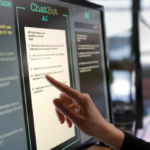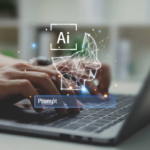Gone are the days of sifting through stacks of resumes manually. AI has elevated the hiring game to a new efficiency level. AI’s emergence marks a pivotal moment, streamlining traditional processes and propelling us into a future where hiring is faster, wiser, and more precise.
This blog post unfolds the transformative journey of AI in job applications, exploring its profound impact on candidate selection, assessment, and the overall recruitment experience.
The Current Job Application Landscape
In the field of job applications, we find ourselves exploring a system dominated by traditional methods that often prove arduous and time-consuming. Resumes pile up, and hiring managers face the daunting task of manually sifting through each one. It’s a process laden with inefficiencies and subjectivity.
Enter the need for innovation. The current job application scene is crying out for a breath of fresh air—a solution that goes beyond the limitations of the status. Picture this: endless hours spent screening resumes, the risk of overlooking qualified candidates, and the inherent bias in subjective decision-making.
Benefits of AI in Hiring
In the world of hiring, Artificial Intelligence (AI) emerges as a game-changer. It revolutionizes the traditional approach with many benefits. Some of them are:
- Time and Cost Efficiency
AI introduces a swift and cost-effective paradigm to the hiring process. Imagine the hours spent sifting through resumes reduced to mere minutes. With AI algorithms at play, the tedious task of manual screening becomes a relic of the past. Time is money, and AI ensures you save both.
Once characterized by delays and bottlenecks, recruitment processes now operate at unprecedented speeds. The efficiency gains are not confined to time alone but to resource allocation. Organizations can redirect human resources to more strategic tasks, enhancing overall productivity.
- Reduction of Bias in the Hiring Process
One of AI’s most significant hiring advantages lies in its ability to minimize biases. Traditional hiring methods may inadvertently introduce subjective judgments, leading to unfair practices. AI, operating on data-driven insights, treats every candidate impartially, leveling the playing field.
AI algorithms are designed to focus on skills, qualifications, and experience without being influenced by irrelevant factors. This impartial approach creates a diverse and inclusive workforce where individuals are evaluated solely based on merit.
- Improved Candidate Experience
In the competitive talent acquisition landscape, the candidate’s experience is paramount. AI is pivotal in enhancing this experience by streamlining the application process. Candidates receive prompt responses, reducing the frustrating waiting period often accompanying traditional hiring.
AI-driven platforms offer a user-friendly interface, making the application and assessment process more intuitive. This improves the overall experience for candidates and enhances the employer brand, portraying the organization as technologically advanced and candidate-focused.
- Enhanced Accuracy in Candidate Matching
Matching the right candidate to the right job is critical to successful recruitment. AI brings unprecedented accuracy to this process by analyzing resumes, extracting essential information, and aligning candidate profiles with job requirements.
AI systems use natural language processing and machine learning to identify subtle nuances in candidate qualifications, ensuring a precise match. This saves recruiters time and improves the likelihood of selecting candidates who align perfectly with the job specifications.
- Predictive Analytics for Talent Acquisition
AI doesn’t just stop at efficient screening; it ventures into predictive analytics to forecast future hiring needs. By analyzing historical data and identifying patterns, AI can provide insights into the skills and attributes most likely to contribute to organizational success.
Predictive analytics empower businesses to proactively plan for talent acquisition, addressing potential skill gaps before they impact operations. This forward-looking approach positions organizations to stay ahead in a dynamic job market, ensuring a strategic and well-prepared workforce.
- Continuous Improvement Through Machine Learning
The beauty of AI lies in its ability to learn and adapt continuously. Machine learning algorithms analyze recruitment outcomes, identifying patterns and areas for improvement. This iterative process leads to an ever-evolving, refined hiring system.
As AI learns from past successes and challenges, it becomes more adept at understanding organizational needs and candidate preferences. This continuous improvement loop ensures that the hiring process remains agile, efficient, and aligned with the evolving dynamics of the job market.
Cost-Effective Skill Assessment
AI-powered assessments go beyond traditional methods by offering cost-effective and scalable solutions for evaluating candidate skills. From coding challenges to situational judgment tests, AI enables organizations to conduct assessments tailored to specific roles.
These assessments provide a comprehensive understanding of a candidate’s abilities and contribute to a fair and standardized evaluation process. This eliminates the potential for subjective biases and ensures that candidates are assessed on their competencies, promoting a merit-based approach.
- Streamlined Communication and Collaboration
Effective communication is crucial throughout the hiring process. AI facilitates seamless communication by automating routine tasks, such as scheduling interviews and sending status updates to candidates. This streamlining allows recruiters to focus on meaningful interactions with candidates.
Collaboration among hiring teams also benefits from AI tools that centralize information and feedback. The ability to share insights and collaborate in real-time enhances decision-making and ensures all stakeholders are on the same page, fostering a cohesive and efficient recruitment workflow.
Implementing AI in Your Hiring
Transitioning to an AI-driven hiring process may seem monumental, but fear not—implementing AI can be a gradual and rewarding journey for your organization.
- Assessment of Current Processes
Begin by understanding your existing hiring processes. Identify pain points, bottlenecks, and areas where AI can bring the most value.
- Define Objectives
Clearly outline your goals and expectations from implementing AI. Whether it’s reducing time-to-hire, improving candidate quality, or enhancing diversity, having defined objectives guides your AI integration strategy.
- Choose the Right AI Solutions
Explore AI tools that align with your specific hiring needs. From resume parsing to candidate assessments, there’s a diverse range of solutions catering to different aspects of recruitment.
- Training and Onboarding
Equip your HR team with the necessary skills to work alongside AI tools. Training programs ensure a smooth transition and empower your team to leverage AI effectively.
- Pilot Programs
Start small by implementing AI in specific areas of your hiring process. This allows you to test the waters, gather feedback, and adjust before full-scale integration.
- Integration with Existing Systems
Ensure seamless integration with your existing HR systems. Compatibility with your applicant tracking system (ATS) and other tools streamlines the recruitment workflow.
Best Practices for AI-Driven Recruitment
Transitioning to an AI-driven hiring process may seem monumental, but fear not—implementing AI can be a gradual and rewarding journey for your organization.
- Communication and Transparency
Communicate the introduction of AI to your team and candidates. Transparency builds trust and fosters a positive perception of AI within your organization.
- Continuous Monitoring and Evaluation
Regularly assess the performance of AI tools. Monitor outcomes, identify areas for improvement, and make adjustments to enhance the effectiveness of the AI-driven processes.
- Feedback Loops
Establish feedback mechanisms for both candidates and internal stakeholders. This iterative feedback loop ensures that AI continuously evolves to meet the evolving needs of your organization.
- Data Security and Compliance
Prioritize data security and compliance with regulations. Ensure that AI tools adhere to privacy standards, safeguarding sensitive candidate information.
- Customization for Your Organization
Tailor AI solutions to fit the unique needs and culture of your organization. Customization enhances the relevance and effectiveness of AI in your specific hiring context.
- Human Oversight
Maintain human oversight throughout the process. While AI brings efficiency, the human touch is essential for nuanced decision-making, ensuring a balanced and ethical hiring process.
Best Platforms for AI Job
In the rapidly evolving landscape of job applications, leveraging AI tools and platforms can be a game-changer for employers and candidates. iApply stands out as a leading solution, seamlessly integrating AI into recruitment.
- iApply
iApply combines the power of machine learning and natural language processing to revolutionize the job application experience. From parsing resumes to conducting comprehensive candidate assessments, iApply streamlines the entire hiring journey. - JobScan
JobScan focuses on optimizing resumes for Applicant Tracking Systems (ATS). Analyzing job descriptions and resumes ensures that candidates’ applications align with the specific keywords and criteria set by employers. - Ideal
Ideal uses AI to automate the screening process, providing a shortlist of top candidates based on predetermined criteria. Its predictive analytics contribute to smarter hiring decisions and efficient candidate matching. - XOR
XOR specializes in AI-driven chatbots for recruitment. These chatbots engage with candidates, answer queries, and even conduct preliminary assessments, enhancing the efficiency of candidate communication. - Textio
Textio employs AI to analyze and optimize job descriptions for inclusivity and effectiveness. It helps organizations create job postings that resonate with a diverse pool of candidates, ultimately improving the quality of applications.Choosing the Right Platform for Your Organization
Choosing the right platform for your application is very important. Consider the following key points when choosing any platform for AI job applications.
- Identify Specific Needs
- Assess your organization’s unique hiring requirements. Whether it’s resume parsing, candidate screening, or chatbot-driven engagement, identify the specific functionalities that align with your goals.
- Scalability
Consider the scalability of the AI platform. Ensure it can accommodate your organization’s growth and evolving recruitment needs without compromising efficiency. - Integration with Existing Systems
Seamless integration with your current ATS and other HR systems is crucial. Compatibility ensures a smooth workflow and prevents disruptions in your established processes. - User-Friendly Interface
Opt for platforms with user-friendly interfaces. An intuitive design simplifies the onboarding process for your HR team, maximizing the benefits of AI without a steep learning curve. - Customization Options
Look for platforms that offer customization. The ability to tailor AI tools to your organization’s needs enhances their relevance and effectiveness in your unique hiring context. - Data Security Measures
Prioritize platforms that adhere to robust data security measures. Protection of sensitive candidate information is paramount, ensuring compliance with privacy regulations. - Trial Periods and Demos
Many AI platforms offer trial periods or demos. Take advantage of these opportunities to experience the platform firsthand, evaluate its performance, and determine its compatibility with your hiring processes.
Conclusion:
Incorporating AI tools like iApply into your job application process enhances efficiency and ensures a more objective and streamlined recruitment experience. As technology continues to shape the future of hiring, choosing the right AI platform becomes a strategic decision that sets the foundation for success.








